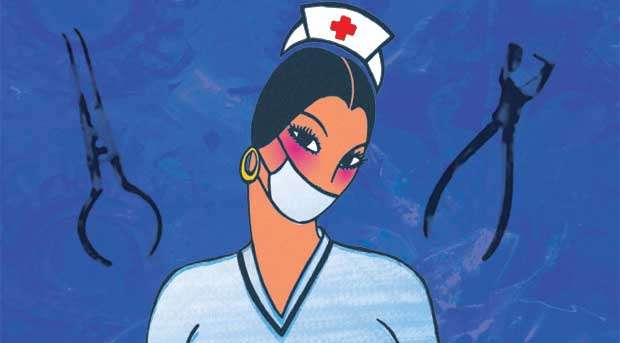Terror of the dentist is like an epidemic, one that infects most men.
When facing the dentist’s chair, even heroes lose their badge of courage. Legs shake, jaws chatter. Any brave soul with more medals than Marshal Zhukov will try to postpone his appointment, explaining that he has an urgent work-related matter to attend to that afternoon; in fact, he has to make a speech. Why don’t we just solve it with a Band-Aid, and “we’ll see you next week, Doc.” But if next week comes and the pain has by some chance subsided, then the appointment is postponed until next month. Or next year.
The furniture in a dentist’s office is apparently designed to inspire fear. Nobody has come up with new designs for inspiring confidence and security. It’s probably because their designers are influenced by those alien contraptions we see in Hollywood movies, with those mechanical arms that end in pincers to penetrate the noses, eyes and mouths of their earthling prisoners and extract their brains.
The chair and the dentist himself, whose face reminds you of a Luis XVI-era executioner, are not the only scary elements in a dentist’s office. Their needles are totally unlike the ones used for a diabetic’s insulin shots, and their pliers are completely different from an electrician’s, even though it would be so easy for them to be the same.
Tough guys with cavities say they’re not afraid of the dentist. But they can’t stand the screech of the machine against their teeth, because “it makes their hair stand on end.” Others attribute their neglect of oral hygiene to a traumatic event. Such is the case with my friend Reinaldo, whose name I feel obliged to change out of respect for his dignity.
Reinaldo suffers from mind-numbing toothaches. Two years ago, he braved his fears and decided to end the pain. Commending himself to all of his saints, he set out for the dental clinic in the morning. However, when he boarded the bus, he came across a cure that he believed would assuage even the agonies of hell. He was so impressed that he forgot his troubles.
One of his fellow passengers was a young woman who looked like one of Wilson the cartoonist’s creations: a graphic depiction of the sculptural beauty of Cuban women.
“Holy smokes!” he said. But he said it out loud. And with that spontaneous flair that we Cubans have, he went on and dared to say much more.
The young woman, Cuban through-and-through, was offended. In a word, she told him he was “insolent and foul-mouthed,” and that “if I were a man I would deck you.” And that’s when another rider jumped into the fray—he was one of those opportunists who pop up anywhere, at any time, just waiting for a chance: “You just keep being the woman that you are, darlin’; I’ll be the man here.”
And the brawl was on.
As the tough guy regretfully watched his “darlin’” continue on her way aboard the bus, he was marched to the police station, accompanied by the girl’s eloquent admirer (Reinaldo) and two officers of the law who had responded to the bus driver’s call.
Three hours later, and with a hefty fine for disturbing the peace, Reinaldo finally made it to the clinic, his pain enhanced by a smack to the left side of his face, right where his molar was killing him. He sat down to wait for his turn.
The voice that announced “next patient” sounded familiar, but the torment of his ailing tooth kept him from stopping to think about it. When he got to the doorway of the doctor’s office, there was the girl from the bus, dressed in a sparkling white dentist’s coat and looking at him with the same incredulous expression that he was wearing.
“Sit down,” she said dryly and precisely. But Reinaldo didn’t have the guts.
“I’m sorry, Doctor,” he said. “I’ve got the wrong office.”
And with that he disappeared down the hallway, straight for the exit.
Today Reinaldo swears that he conducted himself properly. And he tells the story with a martyr-like conviction that leaves his listeners rolling with laughter. Behind his back, naturally, because Reinaldo’s bad mood from the persistent torture of his blessed tooth is a constant, as is his fear of taking that mortal leap to finally remove the horror of his suffering.
(By: Julio A. Martí)










